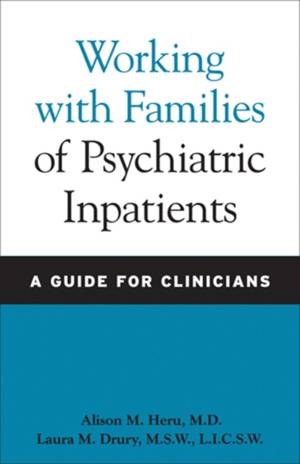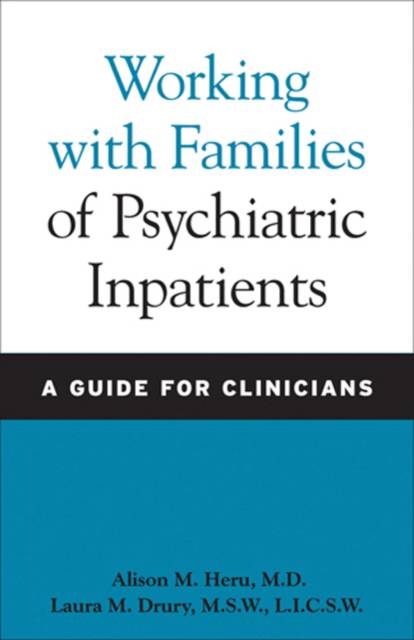
- Retrait gratuit dans votre magasin Club
- 7.000.000 titres dans notre catalogue
- Payer en toute sécurité
- Toujours un magasin près de chez vous
- Retrait gratuit dans votre magasin Club
- 7.000.000 titres dans notre catalogue
- Payer en toute sécurité
- Toujours un magasin près de chez vous
Working with Families of Psychiatric Inpatients
A Guide for Clinicians
Alison M Heru, Laura M DruryDescription
Working with the families of inpatients is one of the most important--and most challenging--aspects of practicing clinical psychiatry. Clinicians are responsible not only for the well-being of their patients but also for the education and guidance of the patient's family. In this book, Alison M. Heru and Laura M. Drury offer a step-by-step guide to developing the skills needed to work successfully with patients' families.
Research data, outlined in the opening chapters, demonstrate just how essential families and evidence-based family treatment are to effective patient care. Succeeding chapters use clinical case studies to illustrate the skills necessary for the assessment and treatment of the family. Psychiatric residents will enhance their knowledge of the family as a part of the patient's social context and learn how to conduct a family meeting, common mistakes to avoid, and when to refer the family for other assistance. The authors also describe specific strategies for intervening with difficult families and for overcoming some of the fears and anxieties common among residents when they interact with patients' families.
The authors provide valuable insights into the perspectives of families and patients and offer practical suggestions for risk management after the patient is discharged from inpatient care.
Keyed to the requirements articulated by the American College of Graduate Medical Education, this handbook is a tool no psychiatric resident can do without.
Spécifications
Parties prenantes
- Auteur(s) :
- Editeur:
Contenu
- Nombre de pages :
- 192
- Langue:
- Anglais
Caractéristiques
- EAN:
- 9780801885761
- Date de parution :
- 01-04-07
- Format:
- Livre relié
- Format numérique:
- Genaaid
- Dimensions :
- 140 mm x 216 mm
- Poids :
- 340 g







